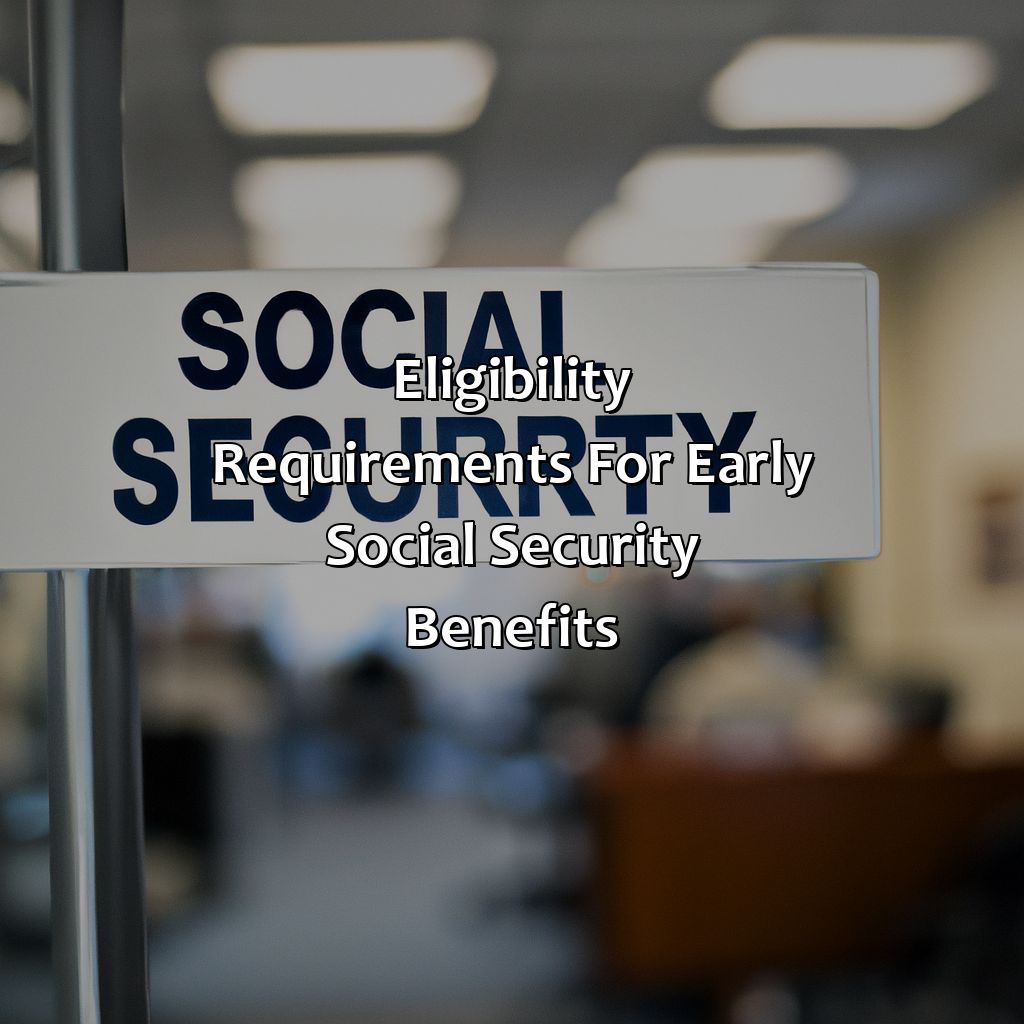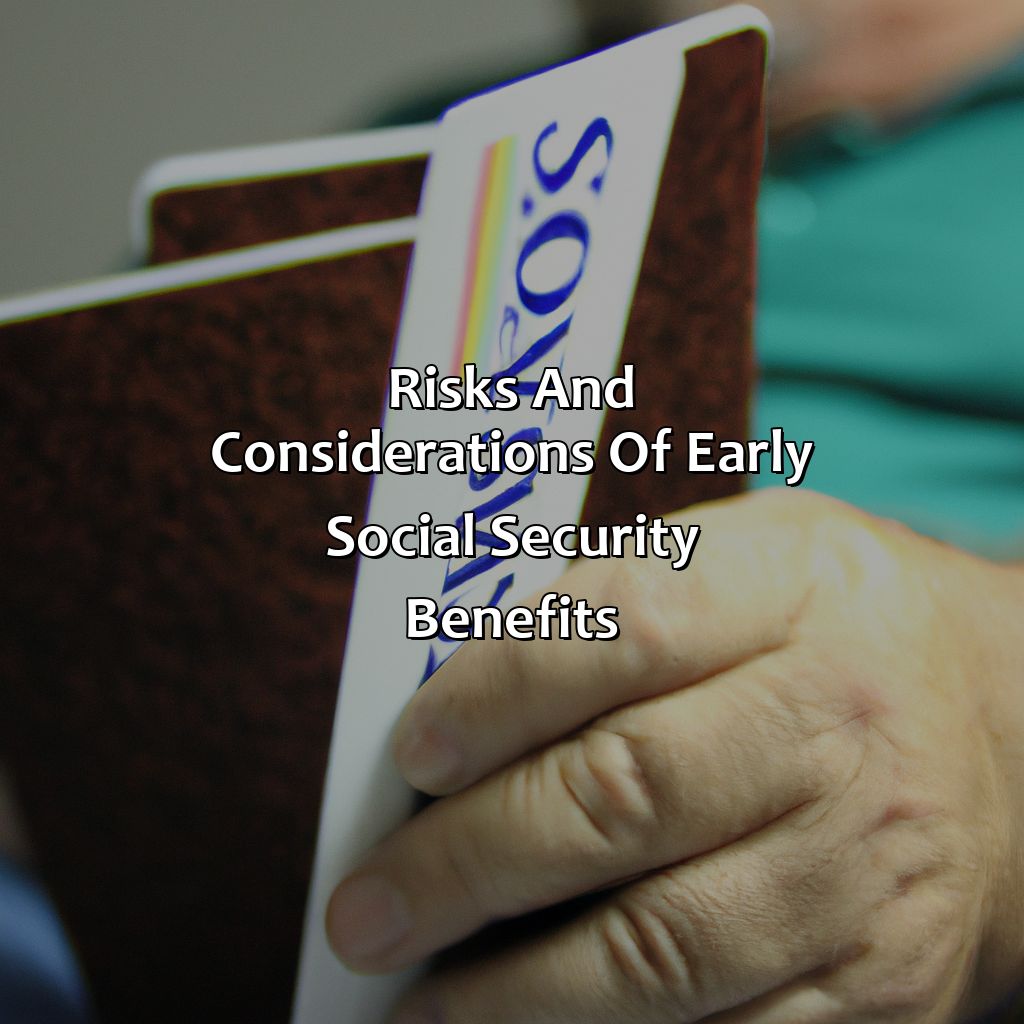How To Get Social Security Early?
Key Takeaway:
- Eligibility for early social security benefits depend on age, disability or survivor status.
- Receiving early retirement benefits at age 62 means reduced benefits and may impact monthly benefits for the rest of your life.
- Applying for early social security benefits is possible through online or in-person application, with required documentation.
- Risks and considerations of early social security benefits include reduced lifetime benefits, limited working opportunities, and impact on other retirement savings.
- Alternatives to early social security benefits can include delayed retirement credits, supplemental retirement savings, and part-time work.
Are you worried about retirement planning? Don’t know when is the right time to start collecting Social Security? Get all the answers you need in this article and find the best plan for you!
Eligibility Requirements for Early Social Security Benefits
Understand early social security benefits! It’s possible, but you must meet specific criteria. Let’s explore the requirements for eligibility. Age, Disability and Survivor Benefits are the three sub-sections we’ll discuss. Find out how you can qualify for social security ahead of time!

Image credits: retiregenz.com by Yuval Arnold
Age Requirements
The required age for early Social Security benefits is dependent on an individual’s year of birth. Full retirement ages range from 65 to 67 years old. To receive early Social Security benefits, individuals must meet specific age criteria but at a reduced rate.
When individuals take early Social Security benefits, they will not receive the full amount they would get if they waited until their full retirement age. The reduced payment lasts for life and decreases yearly based on how many months ahead of full retirement an individual claims benefits. For example, claiming 36 months in advance reduces monthly payments by 20%.
It is essential to note that receiving reduced payments can result in significant lifetime losses. Therefore, eligible individuals should consider their options carefully and seek professional advice before making any decisions about taking early social security benefits. Don’t miss out on your opportunity to maximize social security payments – talk with a financial planner today. They can help you understand all aspects of claiming early benefits while considering vital factors such as life expectancy and long-term financial goals.
You may qualify for disability benefits, but if you’re faking it just to retire early, well, that’s just wheelie uncool.
Disability Requirements
Social Security Benefits for Those with Disabilities
To be eligible for Social Security Disability benefits, a person must have a medically documented disability that is expected to last at least one year or result in death. The condition must prevent the individual from doing any substantial gainful activity. Additionally, the disability must be listed on the Social Security Administration’s list of eligible conditions or deemed equivalent. Other factors that may impact eligibility for early Social Security benefits based on a disability include age and work history.
It is essential to note that the process of applying for Social Security Disability benefits can be complex and time-consuming. It is recommended to seek professional assistance when completing the application and gathering medical documentation.
In summary, individuals seeking early Social Security benefits due to a disability need to meet specific eligibility requirements set forth by the Social Security Administration. These requirements include having an eligible medical condition preventing substantial gainful activity and meeting other age and work history criteria. Seeking professional help during the application process could help simplify this complicated process.
History shows that many individuals suffering from disabilities do not apply for or are denied disability benefits due to misinformation, complexity, or fear of being rejected. This lack of application and approval leads to lost opportunities and financial instability for Americans living with disabilities.
Even in death, you can still collect social security – talk about job security.
Survivor Benefits
Surviving Family Member Benefits
Surviving family member benefits are provided to eligible surviving family members of a deceased individual who was receiving or entitled to receive Social Security benefits. Here are six key points about these benefits:
- Eligible surviving spouses can receive full survivor benefits at full retirement age, or reduced benefits starting at age 60.
- Surviving spouses caring for a child under the age of 16 may qualify for additional benefits.
- Dependent children under the age of 18, or up to the age of 19 if they are still in secondary school, can receive survivor benefits.
- Disabled children may also be eligible for survivor benefits if they have become disabled before the age of 22.
- Surviving parents who were dependent on the deceased individual may also be eligible for survivor benefits in certain circumstances.
- The amount of survivor benefit payment is based on the deceased’s earnings.
It is important to note that certain eligibility requirements must be met in order to qualify for surviving family member benefits.
In addition, it is worth mentioning that initially, Social Security did not cover surviving family members. It was only after amendments were made to the Social Security Act in 1939 that surviving spouse and children’s insurance was introduced. Prior to this, many widows and children suffered financial difficulties after the death of their primary breadwinner. The introduction of these survivor benefit programs helped provide financial security for many families facing difficult times.
Who needs a midlife crisis when you can just take early retirement and live off social security?
Early Retirement Benefits
Want to know about Early Retirement Benefits for Social Security? We’ve got the deets! Find out about Reduced Benefits at Age 62. Plus, see how it impacts your Monthly Benefits. And, if you’re curious, you can even learn about Working While Collecting Benefits! Read on!

Image credits: retiregenz.com by David Arnold
Reduced Benefits at Age 62
Did you know that you can get Reduced Benefits while retiring early at age 62? Here are some crucial points to note:
- If you choose to retire early at 62, your social security benefits will be reduced by around 30% compared to your retirement age (which might vary depending on your birth year).
- However, the good news is that the reduction in benefits doesn’t last forever. Your benefit amount increases once every year until you reach full retirement age.
- There’s also an earning limit when you opt for early retirement. You cannot earn more than a certain amount annually without experiencing further reductions in your social security benefits.
- It’s essential to calculate how these reductions might affect your future finances before deciding to retire early.
When considering reduced benefits at age 62, it’s vital to know that there are unique details worth considering. For example, choosing an immediate social security benefit reduces payments permanently, and claiming spousal credit can change options.
If you’re still thinking about retiring early and receiving reduced benefits at age 62, here are some suggestions for you:
- Keep yourself informed with all the rules related to Social Security and reduced benefits before making any decision.
- Work part-time during retirement or develop another revenue source if possible.
- If feasible, think of delaying retirement until you’re eligible for full retirement benefits since the increase adds up over time.
Knowing what options could help maximize income from Social Security in consideration of reduced benefits is essential as decisions could impact financial stability in life after retirement.
Retiring early may impact your monthly benefits, but hey, who needs money when you’ve got all that extra free time to fill?
Impact on Monthly Benefits
The Effect of Early Retirement on Social Security Entitlements
Early retirement significantly impacts monthly benefits of social security. Here are five points to consider:
- Reduction in monthly benefits: If you retire before the full retirement age, there will be a reduction in your monthly benefit which is permanent.
- Delayed retirement credits: If your retirement starts after full retirement age, your deferred benefits increase up to 8% per year until age 70, providing an excellent opportunity to maximize your monthly payment.
- Calculation methodology: Social security calculates the earliest benefit based on the number of years worked and how much you earned during that time period. The higher the number of years worked, the better.
- Spousal benefits: A spouse receives 50% of what you get; however, if you apply early, even spousal benefits will be reduced correspondingly.
- Taxes: Early money withdrawals may lead to penalty and taxation impact later upon receiving social security payments.
It is vital to note that early social retirement can result in reduced income streams throughout the future. It would be best not to overlook this effect while taking early pension plans.
One suggestion is delaying or suspending individual’s Social Security benefit loss by increasing other potential revenue streams like part-time work or investments with higher yields. Another approach is minimizing liabilities such as property taxes or fees by downsizing significant expenses or moving into less expensive housing options.
Don’t worry, working while collecting benefits just means you get to play the ultimate game of ‘double dipping’.
Working While Collecting Benefits
While Receiving Social Security Payouts, you can earn some income. If working while collecting benefits, be careful as your earnings may reduce your pay. Your payout will increase when you retire completely.
The Social Security Administration (SSA) sets a particular limit each year known as an ‘earnings test‘. For individuals currently receiving retirement payouts but are under Full Retirement Age (FRA), their payouts get reduced by $1 for every $2 of earnings above the annual limit. The year’s deduction limit for 2021 is $18,960.
The good news? If you continue working and are subject to the earnings test, SSA provides benefit credits that bump up your future payouts once you reach FRA on top of automatic adjustments induced by inflation.
Additionally, most recipients also pay Federal taxes too based on their social security benefits and other income sources.
A recent survey from the Government provides that around 66% of retirees’ primary source of revenue comes directly from social security payments.
Want to apply for early social security benefits? Just remember the three keys to success: paperwork, patience, and a strong desire to avoid the rat race.
How to Apply for Early Social Security Benefits
To get early social security benefits, you must apply. See the section “How to Apply for Early Social Security Benefits”. It has three sub-sections:
- Online application
- In-person application
- Required documentation
Each of these sub-sections provides different ways to apply for your benefits and what paperwork is needed.

Image credits: retiregenz.com by Yuval Jones
Online Application
To apply for Social Security Benefits early, individuals can opt for a digital process. You can access the official Social Security Administration website and begin filling out the online application after meeting all the eligibility criteria.
Once you begin the application process, you will need to provide personal details like name, address, social security number, date of birth, income and employment information. Along with this, medical records and relevant documentation supporting your claim must also be submitted.
After submitting your request digitally via e-application, you will receive an acknowledgment from the administration staff within 10 business days regarding further proceedings.
Did you know that by applying for Social Security benefits before reaching full retirement age (between 66-67 years), individuals may face permanent reductions in their lifetime earnings? Hence it’s vital to acknowledge all the implications of opting for early social security benefits before completing the application process.
Get ready for a fun-filled day at the Social Security office, because nothing says excitement like filling out paperwork and waiting in line!
In-Person Application
The Process of Applying for Social Security Benefits in Person
Applying for social security benefits in person is an option available to those who prefer face-to-face interaction or require special accommodations. To begin, locate your nearest Social Security Administration (SSA) office and schedule an appointment. The application process involves providing identification documents, citizenship status proof, and work history details. SSA representatives will review your application and supporting documentation and inform you of the decision.
It’s important to note that applying in person can be time-consuming due to long wait times at some SSA offices. It’s advisable to arrive early before the scheduled appointment and bring all necessary documents. Additionally, consider scheduling the appointment mid-week when there are usually shorter wait times.
Overall, scheduling an in-person appointment is a useful way of applying for social security benefits as it provides tailored assistance from SSA representatives.
Get ready to channel your inner hoarder, because you’ll need more paperwork than a government spy to apply for early social security benefits.
Required Documentation
To successfully apply for Social Security Benefits sooner than later, applicants require specific documents to complete the process. These paper works include birth certificates, employment records, and tax returns, among others. Presentation of proper documentation will facilitate an efficient processing period and prevent any delays.
It is essential to provide authentic documentation to prove eligibility requirements and clear entitlements to early social security benefits. One should present documents such as proof of citizenship or residency, banking information as well during the application process to ensure that the application proceeds smoothly.
Applicants might also need to submit additional documentations depending on their unique circumstances or if they have previously received other government benefits from different programs.
According to a recent report by AARP (American Association of Retired Persons), eligibility for Social Security relies on credits earned throughout one’s working years, where up to four can be earned every year. These credits are awarded once an individual has earned specific amounts of money for each credit per annum.
Taking early Social Security benefits is like playing roulette, except the only numbers you’re hoping to avoid are ‘broke’ and ‘homeless’.
Risks and Considerations of Early Social Security Benefits
Want to comprehend the dangers and concerns of taking early social security? Look into the sub-sections:
- Reduced lifetime benefits
- Limited employment prospects
- Effect on other retirement funds
These factors must be considered intently to make sure that taking social security early is the right move for your case.

Image credits: retiregenz.com by David Duncun
Reduced Lifetime Benefits
By taking Social Security benefits early, your lifetime benefits may get reduced. This risk comes into existence because the age when we collect Social Security is an important factor in determining a person’s benefit amount. If someone retires at age 62 rather than Full Retirement Age, their monthly check will be permanently reduced by up to 30%. The reduction percentage varies on a sliding scale based on the number of months before an individual reaches full retirement age.
Therefore, it is significant to consider the trade-off between getting Social Security early and receiving smaller payments for life or delaying Social Security claiming until Full Retirement Age or later and receiving higher benefits. Careful consideration and financial planning can help one determine which option makes sense for them.
It is worth noting that in some cases, taking a reduced monthly benefit could still make sense if someone has other sources of retirement income and needs immediate cash flow. Furthermore, delaying Social Security benefits does not necessarily mean getting higher lifetime benefits. Life expectancy and other personal factors play essential roles in determining the optimal claiming strategy.
Many financial advisors suggest exploring various paths with a trusted advisor before making any decisions about when to claim social security benefits. In recent years, AARP Financial Services released a survey revealing that nearly two-thirds of pre-retirees had difficulty describing how they will use their savings once they stop working.
A client of mine retired at 63 but did not start collecting her social security until she reached full retirement age at 66. At the time she was three years younger than her spouse who started collecting his benefit as soon as he retired at 62. Because they planned well together over several decades, his early start did not affect their overall quality of life.
Why work when you can retire early and live off social security? Just kidding, please don’t do that.
Limited Working Opportunities
Considering Early Social Security Benefits has drawbacks for those with limited opportunities to work. Without steady income, one would need additional finances to meet their daily needs as benefits may not be sufficient. Moreover, accepting retirement benefit early leads to a permanent reduction in monthly payment to those who delay their payments.
It is important to note that individuals who continue working while receiving their benefits face deductions if they earn over the yearly limit, which may impact future benefit amounts. Opting for Disability benefits at an early age also decreases the amount of Social Security Retirement Benefits they could receive because it reduces the number of years they have worked.
Planning and managing finances efficiently can help support daily living expenses while delaying Social Security claims, resulting in a higher benefit later. It’s essential to research and plan before deciding when to avail of Social Security payments.
Delaying social security benefits until full retirement age or beyond allows for more significant monthly payouts and providing financial security during retirement’s later years. Retiring early with Social Security benefits is like robbing Peter to pay Paul, except Peter is your 401(k) and Paul is your monthly bills.
Impact on Other Retirement Savings
The decision to take early Social Security Benefits can have a significant impact on one’s overall retirement savings. By taking Social Security before full retirement age, one may reduce the amount of benefits received each month. This reduction could mean that an individual will need to tap into their other retirement savings earlier than anticipated.
Not only does taking early Social Security benefits affect the monthly payout, but it can also impact other sources of income in retirement. For example, if an individual relies on IRA or 401(k) distributions in addition to Social Security, they may be pushed into a higher tax bracket due to the reduced annual income of taking early benefits.
To avoid this potential issue, it is recommended that individuals consider delaying taking Social Security until full retirement age or even later if possible. One way to bridge the gap between early retirement and full eligibility for Social Security is by utilizing other savings vehicles such as Roth IRAs or taxable investment accounts.
While it may be tempting to take Social Security early for various reasons, it is essential to weigh the long-term impact on overall retirement savings and income. Consider speaking with a financial advisor to determine what strategy may work best for an individual’s unique situation.
Delaying gratification may not be as fun as cashing in early, but it sure beats collecting pennies for the rest of your life.
Alternatives to Early Social Security Benefits
Explore the Alternatives to Early Social Security Benefits. Delayed Retirement Credits, Supplemental Retirement Savings, and Part-Time Work may provide solutions to your needs. Make sure you receive Social Security benefits before the standard age!

Image credits: retiregenz.com by Yuval Jones
Delayed Retirement Credits
Delayed Retirement Benefits refer to the amount of money you can receive for delaying your Social Security benefits past your full retirement age. By waiting until a later age, you’ll get credits that increase your monthly benefit by a certain percentage. These credits are calculated based on how long you delay taking benefits and can add up to 8% per year.
Delaying your Social Security benefits is an excellent way to increase your future monthly payment amount. Suppose you wait until the age of 70, and notably past your FRA. In that case, your Social Security payment will increase permanently by an additional 8% each year from the age of 66 onwards.
When it comes to delayed retirement credits, one key factor to consider when making the decision to delay has more complex math behind it all than it appears. For example, what if you have a health issue that may limit how long you live? In this case, benefiting less from delaying may make more sense as an option compared to waiting for years.
One suggestion would be assessing financial goals and risk tolerance carefully before making decisions about delayed retirement credits. If individuals need income now and can’t afford delayed payouts, other strategies such as reducing expenses or part-time work should be considered instead of this approach.
Saving for retirement is like playing Jenga, just hope your tower doesn’t collapse before you retire.
Supplemental Retirement Savings
In order to secure your financial future, it’s important to consider additional methods of saving for retirement beyond Social Security. Supplementary Retirement Planning is a crucial step in ensuring you will be able to maintain your lifestyle after you retire.
One popular option is to participate in employer-sponsored retirement plans such as 401(k)s or 403(b)s, which typically offer tax advantages and sometimes employer contributions. Another option is to open an Individual Retirement Account (IRA), which offers similar tax benefits as employer-sponsored plans but may have different contribution limits.
For those who are self-employed, a Solo 401(k) or SEP IRA may be a good choice. Lastly, investing in stocks, bonds, and mutual funds can be a smart way to accumulate wealth over time.
Remember that the earlier you start saving for retirement, the more time your savings have to grow. It’s never too late to begin planning for your future- utilize these options and secure yourself financially.
Pro Tip: Consult with a financial advisor or planner who specializes in retirement savings for personalized advice and guidance on choosing the best supplemental plan for your individual needs.
Part-Time Work
Supplementary Work Options to Boost Social Security Benefits
Securing your future begins with sound financial planning, one of which is maximizing social security payouts. Besides filing early or delaying your claim, you have the option of engaging in supplementary work arrangements and earning additional income.
Part-time jobs offer a great opportunity to earn money without affecting your full retirement benefits. Examples of such jobs include consulting, freelancing, and contract work for short periods. This extra income can either supplement your social security payouts or delay your retirement at a later time.
An outstanding benefit of such arrangements is gaining new skills and exploring interesting opportunities that may lead to more significant income streams. More importantly, picking up a part-time job keeps you active and engaged in doing things you love while also increasing your retirement prospects.
Don’t miss out on this fantastic opportunity to add to your retirement funds by taking up supplementary work options such as seasonal work or gig economy services. Your financial future depends on planning and investing with intelligence.
Some Facts About How to Get Social Security Early:
- ✅ You can start receiving Social Security benefits as early as age 62, but your monthly benefit amount will be reduced if you begin before your full retirement age. (Source: SSA)
- ✅ Your full retirement age will depend on the year you were born, but it is generally between 66 and 67 years old. (Source: SSA)
- ✅ If you delay taking Social Security benefits past your full retirement age, your monthly benefit amount will increase up to age 70. (Source: SSA)
- ✅ You can work and receive Social Security benefits at the same time, although your benefits may be reduced if you earn above a certain amount. (Source: SSA)
- ✅ It’s important to consider your individual financial situation and needs before deciding when to start taking Social Security benefits. (Source: AARP)
FAQs about How To Get Social Security Early?
1. Can I get social security early?
Yes, you can get social security early, as early as age 62. However, it’s important to note that your monthly benefit amount will be permanently reduced.
2. How much will my social security benefit be reduced if I take it early?
If you take social security early, your benefit amount will be reduced by a certain percentage for each month that you take it before your full retirement age. The reduction is based on your full retirement age and can be up to 30%.
3. What is full retirement age?
Your full retirement age is the age at which you can begin receiving your full social security benefit amount. For those born in 1960 or later, the full retirement age is 67. For those born before 1960, the full retirement age varies between 66 and 67.
4. Can I still work and receive social security early?
Yes, you can still work and receive social security early, but there are income limits. If you earn more than the limit, your benefit amount will be reduced. In 2021, the income limit is $18,960 per year.
5. What are the advantages of taking social security early?
The advantage of taking social security early is that you’ll start receiving benefits earlier than if you wait until your full retirement age or later. This can be helpful if you need the income or if you have health issues that may affect your lifespan.
6. What are the disadvantages of taking social security early?
The disadvantage of taking social security early is that your benefit amount will be permanently reduced. This means that you’ll receive less money each month for the rest of your life than if you had waited until your full retirement age or later.
